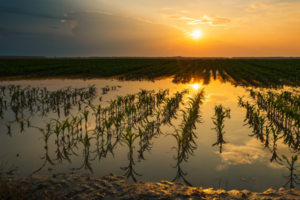Climate data analysis can reduce risks to Ontario farmers
Weather has always played a critical role in agriculture, directing the decisions that growers make in the field. Therefore, accurate long-term forecasting can be a game changer for farmers.
At Niagara College, the analysis of sophisticated weather data is headed by Mike Duncan, PhD, at the Agriculture & Environmental Technologies Innovation Centre (AETIC). Duncan and his team set out to look at what farmers might face in a changing climate. While the forecasts may be distressing, the advantage for growers to have accurate predictive data means the ability to prepare.
“We have raw weather data for southern Ontario for 18 years, including the lakes flooding in 2017, as well as predictive data for climate change over the same area for 18 years in the future, that shows differences in how the rain will fall and how the temperature will change,” says Duncan, who is the Natural Sciences and Engineering Research Council (NSERC) Industrial Research Chair for Colleges, in precision agriculture and environmental technologies.
The AETIC team has analyzed two data sets; the first is a forensic recreation of the weather in farming areas for 2000 to 2018, based on the ERA-Interim global data set, and the second is based on the IPCC RCP(6.0) climate change scenario for the years 2030 to 2048.
Both data sets use the Weather Research and Forecasting (WRF) – a state-of-art model that generates 140 weather variables at 33,075 grid points across the farming areas to allow the Artificial Intelligence (AI) algorithms to make precise climate suitability maps of growing areas to match crop requirements.
[caption id="attachment_22053" align="alignright" width="404"] Flooded Corn Field[/caption]
Flooded Corn Field[/caption]
The second data set also shows a snapshot of what ‘might happen’ if CO2 levels keep increasing, says Duncan. “It is unique in the sense that there are very few realizations of climate change data that show what might happen at the ground level as the climate evolves.”
For southern Ontario, this detailed projection is calling for more significant, more extreme, and more variable rain rates. And winter temperatures are predicted to rise to the tune of one degree Celsius every year, due mostly to the warming of winters. So, longer periods of above 0 C weather.
“While the rise in temperatures may be concerning, the water – the amount and variability of rainfall – is what’s most important to agriculture,” Duncan cautions.
The good news: such simulation data can help farmers make accurate data-based decisions, and Duncan’s team can work with growers and other urban industries to provide specialized weather analysis to help determine the best areas to grow specific crops and to implement management strategies.
Niagara College’s AETIC team works with private and public sector partners to develop innovative solutions to address today’s challenges in agriculture, local and sustainable food production, plant growth, horticulture practices, greenhouse operations, aquaponics and environmental management. Learn more by visiting ncinnovation.ca
Events For Leaders in
Science, Tech, Innovation, and Policy
Discuss and learn from those in the know at our virtual and in-person events.
See Upcoming Events
You have 0 free articles remaining.
Don't miss out - start your free trial today.
Start your FREE trial Already a member? Log in
By using this website, you agree to our use of cookies. We use cookies to provide you with a great experience and to help our website run effectively in accordance with our Privacy Policy and Terms of Service.






